
Congratulations on starting your training with Competenz!
By enrolling in your training programme, you’re launching a career in an exciting and dynamic industry. As workplaces continue to evolve with new technologies and practices, your skills and ideas will shape how we operate in the future.
This is the start of something important — and something you should be proud of. Apprenticeships take time, effort and focus — but you’ll have the support and structure to go the distance. We’ve supported thousands of apprentices like you, and we’ve got a clear structure to guide you through every stage.
This guide is here to help you get started and stay on track. You’ll also receive the Structure of an Apprenticeship booklet, which gives you the full picture of how your training, assessments and support all fit together.
Welcome aboard! We’re excited to support you on this journey.
Apprenticeships are about learning by doing. You’ll build new skills on the job and grow more confident as you go. Every task, challenge and assessment helps you take another step forward.
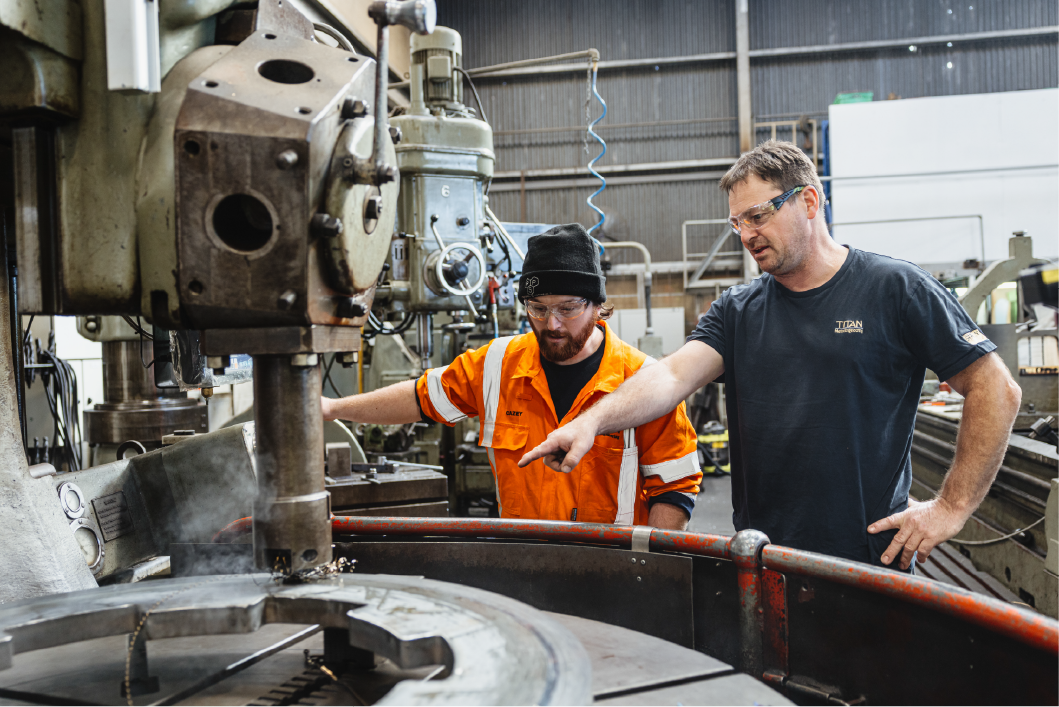
Your programme is carefully designed to support that growth. You’ll complete assessments in a set order, building from the basics toward more advanced skills. Following this sequence matters. It helps you learn the right things at the right time, especially when it comes to safety and practical tasks.
To stay on track, you’ll need to make regular time for learning. This means completing unit standards, keeping up with your training plan and asking for help when you need it.
Throughout your apprenticeship, you’ll be supported by your employer and training advisor — and we’ll help you make the most of every opportunity to learn.
Every workplace is different. Some are big with lots of people. Others are smaller and set up differently. No matter where you work, your training is designed to fit around real work and real learning.
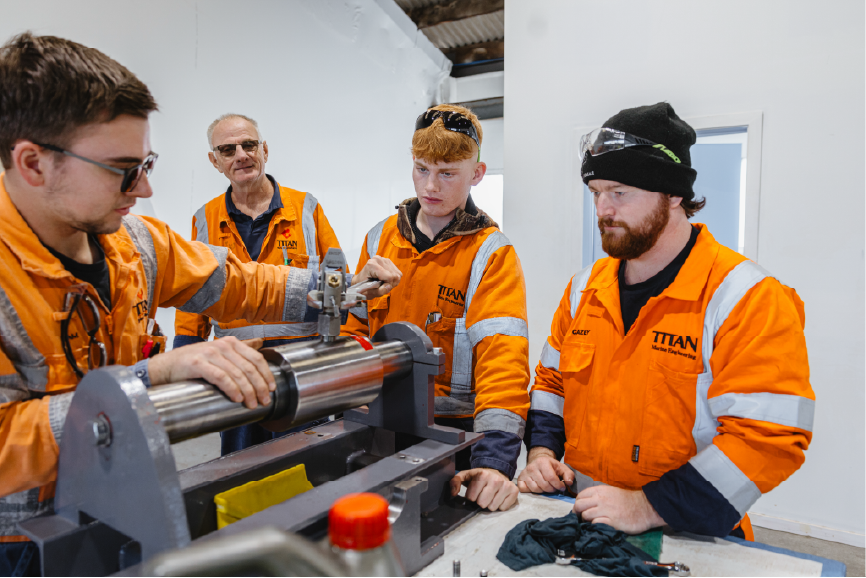
You’ll be learning through a blend of on-the-job experience, online learning and regular support. This is called a blended learning model — it helps you build skills step by step, while getting stuck into real work from day one.
Some programmes also include an off-job component, like block courses held at a campus or training provider. These give you the chance to focus on practical skills in a different setting, often using specialised equipment or learning from subject-matter experts.
Two key people will support you throughout your journey:
Your training plan brings everything together. It shows what you’ll be learning, when to complete assessments, and how each part links to your qualification.
Before your training gets underway, there are a few key conditions you need to meet to stay eligible and on track.
To continue to learn through on-the-job training with Competenz, you must stay employed in the industry you’re training in.
It’s important to keep your workplace and personal contact details up to date. Let your training advisor know of any changes or call 0800 526 1800 to update your information.
If you're working in New Zealand on a work visa, your visa must be valid for the entire length of your training programme. If your visa expires before your programme ends, Competenz cannot report your results to NZQA or issue your qualification.
Your training advisor will check that your visa meets this requirement when you sign your training agreement. Competenz will continue to monitor its validity while you're in training.
If you discover your visa is due to expire during your programme, talk to your employer and training advisor early so you can plan ahead and avoid any disruptions.
If you've already gained skills or knowledge from work or past study, you may be able to have that learning formally recognised. This could mean you don’t need to complete some parts of your training again.
The RPL process is not funded and is offered as a user-pays service. To find out more, search for “Recognition of prior learning” on our website or scan the QR code below.
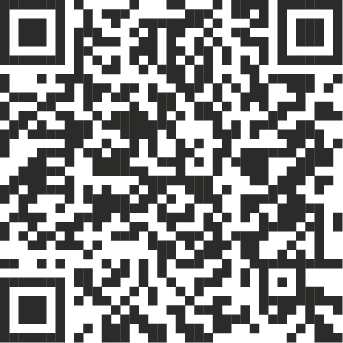
Most of your training will happen on-the-job under the guidance of your supervisor or a qualified tradesperson. You’ll learn by watching, asking questions and then doing the task yourself. Your trainer will show you how to perform the skill, supervise you as you practise, and support you until you get it right.
It’s a great way to learn — so stay curious, pay attention and apply yourself. When your trainer sees that you’re confident and capable, they’ll let your assessor know that you’re ready to be assessed.
Your trainer also acts as your verifier. This means they observe your work and confirm when you’re ready. They don’t make the final assessment decision — that’s up to your Competenz assessor.
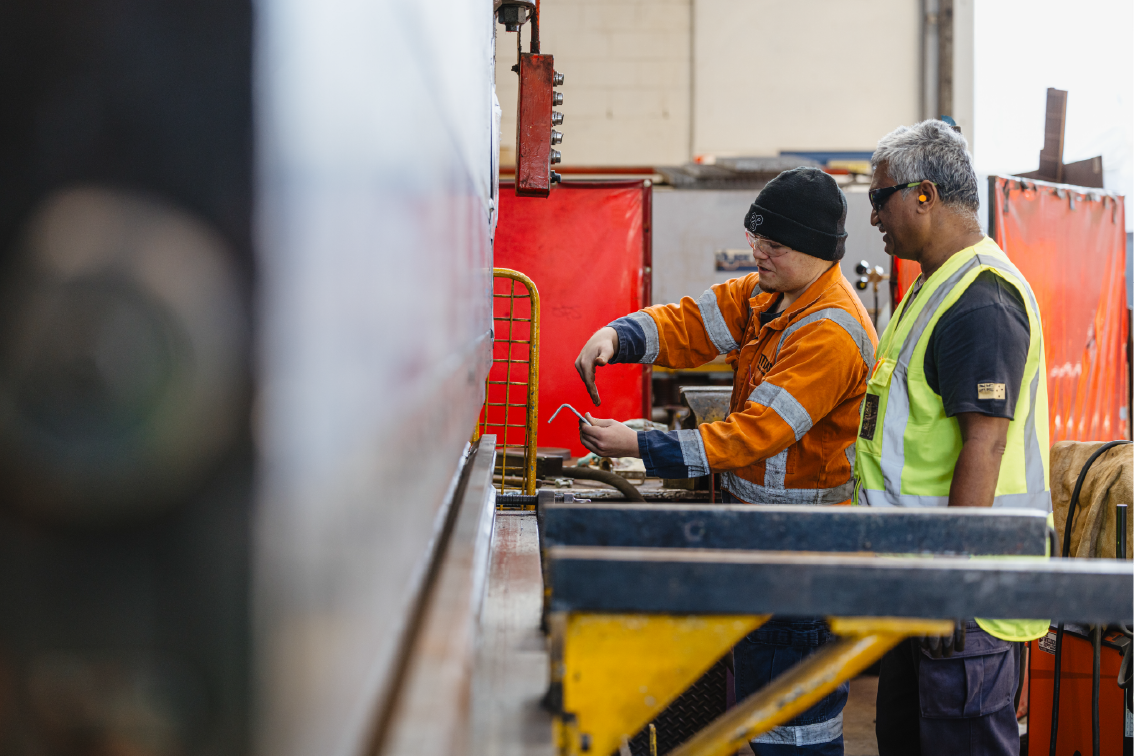
Your training advisor is here to support you throughout your apprenticeship. They’ll work closely with your supervisor to help you build the skills you need, and check in regularly to keep your training progressing smoothly.
They’re also here to figure out what support might help you succeed — whether that’s a new plan, extra resources or simply answering your questions. Your advisor is backed by an awesome team at Competenz, and they really enjoy helping apprentices move forward.
They’ll visit you in-person regularly throughout the year.
During each visit, they will:
You’ll also get a schedule of upcoming visits. And you can contact your advisor any time by phone or email if you need help between visits.
Your Competenz training advisor is your support person and may also act as your on-the-job assessor. An eAssessor will assess any online learning that may be part of your apprenticeship. All assessors are trained for their role and continue to develop their skills through professional development.
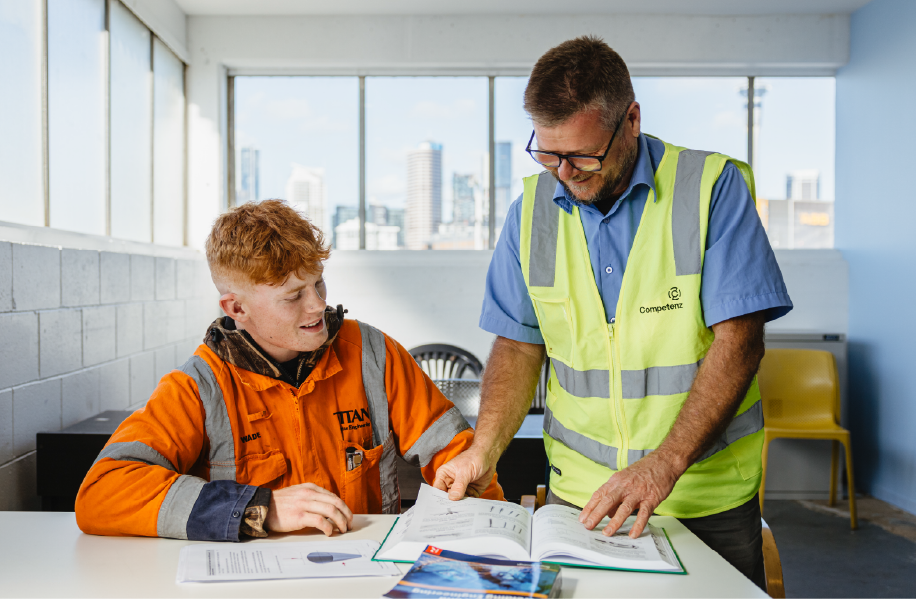
Before you start your formal training, you’ll complete a short onboarding to help you settle in, get confident and learn how everything works.
Our onboarding process gives you the knowledge and skills you need to feel confident in your role and succeed in your learning.
We’ll guide you through the key steps, so you know how to manage your learning, stay on track and find support when you need it.
What’s included:
You’ll find a detailed breakdown of how assessments work in the Structure of an Apprenticeship booklet. Access to and knowledge of the New Zealand Standards may be needed to complete the assessments. This will be detailed in your Training plan.
This section gives you a quick overview and helps you see why doing well in assessments really matters.
Assessments aren’t just about ticking boxes. They’re your chance to prove what you’ve learned, show how far you’ve come and move one step closer to your qualification. Staying focused and putting in the effort now will pay off in the long run — not just with a certificate, but with confidence, skill and job readiness.
Some parts of your learning may be assessed online through the eLearning platform. Competenz has a team of eAssessors who review this work. If you’re unsure about a question or stuck on a task, don’t sit in silence — help is available. You can reach the eAssessors through the Competenz support hub.
Most of your assessment happens on-the-job — showing that you can do the tasks needed in real work situations. A Competenz assessor (or a qualified workplace assessor) will guide this process and make the final call on whether you’ve met the required standard.
You’ll need to work with your verifier to help plan:
Some units will ask for both practical demonstrations and supporting evidence. Keep records, take photos if needed and talk to your verifier about what’s expected. The more prepared you are, the smoother your assessments will go.
For many unit standards, you’ll need to provide evidence that shows you’ve completed a task or developed a skill to the required level. Providing clear, easily verified evidence makes your assessment easier and helps your assessor see that you’re ready to move on.
Here’s how to make collecting evidence simple and stress-free:
You can appeal an overall assessment competency decision if you believe it was not accurate. You must first talk to your assessor about the matter. If you wish to take it further after that conversation, you can ask Competenz to investigate by email QA@competenz.org.nz.
Every step you take in your apprenticeship helps you get closer to your qualification. To get there, you need to keep making steady progress at work and in your learning.
You can read more about how your progress is tracked in the Structure of an Apprenticeship booklet. It explains how assessments work, what counts as progress and what you and your employer need to do to keep things moving.
When you get your learning material and assessment tasks, take some time to plan ahead. Use a calendar or planner to create a simple weekly routine. This will help you avoid cramming at the last minute or feeling overwhelmed and stressed later on.
Try this:
Most apprentices are expected to finish at least one or two units each month. If you fall behind, don’t wait. Get in touch with your training advisor. They can help you make a new plan and talk to your employer if needed.
Your programme is designed to build your skills one step at a time. If you stop making progress, it can knock your confidence and slow down your journey.
Things don’t always go to plan. That’s okay. What matters most is that you stay involved, ask for help when you need it and keep aiming for your goal: a recognised qualification and the confidence to take on more responsibility in your trade.
Your record of achievement is a summary of all the unit standards and qualifications you’ve completed. Each time you pass an assessment and earn credits, it gets added to your record. This is how your progress is tracked — and how you reach your qualification.
You can view your record in one of the following ways:
No one completes an apprenticeship alone. Support can come from your supervisor, your whānau, your training advisor, and your peers. But staying on track starts with speaking up and asking for help when you need it.
If something’s unclear — whether it’s about your training, assessments, or how to manage your time — don’t sit with it. Talk to your training advisor or someone you trust at work. They’re there to help you succeed, but it’s up to you to reach out..
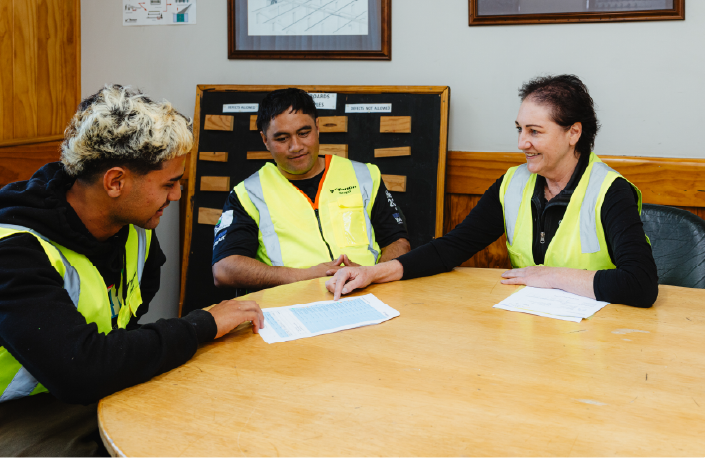
Study groups are held online every two weeks and are open to all apprentices.
They are run by experienced subject experts and are a great place to:
You can take along any questions or areas you're stuck on. To find a study group that suits your programme, talk to your training advisor about how to enrol.
As an apprentice, you’re expected to take responsibility for your own learning and conduct. That means doing your own work, acting professionally and meeting the standards set for your training.
These responsibilities help ensure your qualification is earned honestly and fairly — and that you’re ready for the expectations of the job.
Being honest means your assessment must be your own work and not copied from a book, website, study guide or from another learner’s work. This includes helping another learner complete their assessment, sharing what you wrote, telling someone else the answer, or assisting another learner to complete a practical task that they should be doing on their own.
Your assessments must be your own work and not written by another person or generated using artificial intelligence (AI). Competenz may use AI detection software to check your work is genuine.
Participating in training requires acceptable conduct. Discrimination, bullying, harassment of others, or being under the influence of drugs or alcohol can result in your being removed from training.
Our training programmes are designed to reflect industry best practice and comply with the Health and Safety at Work Act (2015).
Your employer is required to have adequate health and safety procedures and policies in place in the workplace, and to tell you about them.
Finishing your qualification is a major achievement. It shows you’ve committed to learning, built new skills and reached the recognised standard in your trade.
When you complete your programme, you’ll be awarded a formal certificate of achievement. This qualification is a clear sign that you’re ready for more responsibility, greater opportunities and the next step in your career.
Your training advisor will either present your certificate in person or have it couriered to your workplace. You’re right to feel proud because this is a reminder of everything you’ve achieved and the future you’ve prepared for.

You can withdraw from your programme if your personal circumstances change. Please talk to your training advisor about your reasons for withdrawing. We consider this a last resort. There may be a way we can help you continue by adding extra support, or we can put your training on hold for a while.
Your training advisor may recommend that you transfer from one programme to another. Fees may be transferred for approved programme transfers.
Competenz charges their fees pro-rata and a credit will be issued to the party paying for the fees if you withdraw partway through a year.
We’re committed to protecting your privacy and managing your information responsibly.
Competenz is required by law to collect and store personal information from your signed training agreement. This is done in line with the Privacy Act 2020 and the Education Act 2020.
The information we collect helps us manage your enrolment, report progress, and meet legal and industry requirements.
The personal information collected on the training agreement is disclosed to government agencies and may be disclosed to outside organisations as follows:
Competenz securely stores your personal data for 10 years in the learner management system. This will include your programme enrolment, records and assessment results. All completed assessment work is held for moderation purposes (checking the quality and consistency of marking) for 12 months after the end of the qualification. The assessment material may be stored longer if it is involved in an appeal or disciplinary procedure and stored for 7 years if it is used for moderation.
For feedback on your training materials (evidence guides, learner guides, assessments) email: resource.help@competenz.org.nz
You can expect to be asked to take part in confidential Competenz surveys during your enrolment, as well as 6-12 months after you have graduated. Some of those surveys are required by NZQA. Others are for feedback and improvement purposes.
Got a concern or complaint?
If something’s not working, talk to your training advisor first — most issues can be sorted quickly this way.
If you’d rather speak to someone else, you can call us on 0800 526 1800 or fill out a complaints form on our website.
We treat all complaints with respect, confidentiality, and fairness. You’ll get a written response, and we aim to resolve formal complaints within 10 working days.
Search for “Complaints Policy” on our website or scan the QR code below.
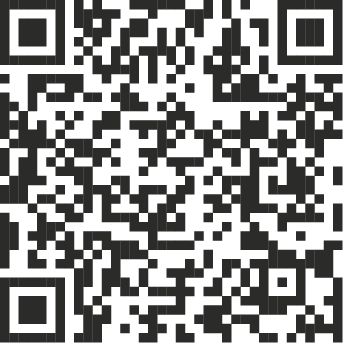
Every apprentice brings something new to our industries — and by learning new skills, you’re creating new possibilities for yourself and the people around you.
Thousands of learners have taken this path and gone on to build great careers. With focus, support and effort, you can do the same.
We’re excited to see where this journey takes you.